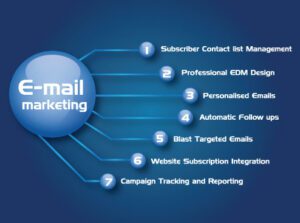Email marketing can be an effective tool for law firms to reach out to potential clients and stay connected with current ones. With the rise of digital communication, email marketing has become famous for businesses to promote their services and increase their brand awareness. Email marketing can be especially beneficial for law firms to build relationships with clients and showcase their expertise in their respective fields.
One key advantage of email marketing for law firms is its cost-effectiveness. Email marketing can be much more affordable and provide a higher return on investment than traditional advertising methods, such as billboards or print ads. Especially by sending targeted and personalized emails to a specific audience, law firms can increase their chances of converting leads into clients and generating more revenue.
However, it’s important to note that email marketing for law firms requires a strategic approach. With strict regulations, such as the CAN-SPAM Act, law firms must ensure that their emails are compliant and provide value to their recipients. By creating engaging and informative content, law firms can establish themselves as thought leaders and build trust with their audience. Email marketing can be a valuable tool for law firms looking to expand their reach and grow their business.

Understanding Email Marketing in the Legal Industry
Email marketing is a powerful tool for law firms to communicate with clients and prospects. However, it requires a practical understanding of the legal industry. This section will discuss some critical considerations for email marketing in the legal industry.
Know Your Audience
Before you begin any email marketing campaign, it is essential to understand your audience. Your audience may include clients, prospects, referral sources, and other stakeholders in the legal industry. Each group has unique needs and interests; your email marketing should reflect that.
Comply with Legal Requirements
The legal industry is heavily regulated, and email marketing is no exception. Before you begin any email marketing campaign, you should comply with all applicable laws and regulations. This includes laws related to spam, data privacy, and email marketing.
Provide Valuable Content
Email marketing is not just about promoting your services. It is also an opportunity to provide valuable content to your audience. This could include legal updates, industry news, and educational resources. By providing valuable content, you can establish yourself as a thought leader in your industry and build trust with your audience.
Use Compelling Subject Lines
In the legal industry, your audience is likely inundated with emails. You need to use compelling subject lines that grab their attention to stand out. Your subject lines should be clear, concise, and relevant to the recipient.
Developing a Targeted Email Strategy for Law Firms
Identifying Your Audience
Before you start sending out emails, it is vital to identify your target audience. This will help you tailor your content to their needs and interests. Your audience could include current clients, potential clients, referral sources, or other professionals in your industry.
To identify your audience, you can start by reviewing your existing client list and categorizing them based on their legal needs. You can also use analytics tools to track website visitors and social media followers to gain insights into their demographics and interests.
Crafting Compelling Content
Once you have identified your audience, it’s time to craft compelling content that will engage them. Your content should be informative, relevant, and valuable to your audience and written clearly and concisely.
Consider using various content types, such as newsletters, case studies, blog posts, and event invitations. You can also include calls to action to encourage your audience to take the next step, such as scheduling a consultation or sharing your content with their network.
Legal Compliance and Ethics
When developing your email strategy, it is essential to ensure compliance with legal and ethical guidelines. This includes obtaining consent from your subscribers, providing an easy opt-out process, and avoiding false or misleading claims.
You should also be aware of any industry-specific regulations that may apply to your firm, such as those related to attorney advertising or solicitation. It may be helpful to consult a legal professional to ensure your email strategy complies with all applicable laws and regulations.

Best Practices for Email Campaign Execution
Email Design and Layout
The design and layout of your email campaigns play a crucial role in their success. A well-designed email with clear and concise content can help you achieve high open and click-through rates. Here are some best practices to follow:
- Use a clean, straightforward design that is easy to read and visually appealing.
- Ensure your email is mobile-friendly and can be easily viewed on different devices.
- Use a clear and attention-grabbing subject line that accurately reflects the content of your email.
- Include a clear call-to-action (CTA) that encourages recipients to take action.
- Use images and graphics sparingly, and make sure they are relevant to the content of your email.
Timing and Frequency
The timing and frequency of your email campaigns can also impact their effectiveness. Here are some best practices to keep in mind:
- Please send your emails at times when your target audience is most likely to be checking their inbox.
- Avoid sending too many emails quickly, as this can lead to unsubscribes and a negative perception of your brand.
- Consider segmenting your email list and sending targeted emails to specific groups based on their interests and behaviours.
A/B Testing and Analytics
A/B testing and analytics can help you optimize your email campaigns for better results. Here are some best practices to follow:
- Test different elements of your email campaigns, such as subject lines, CTAs, and content, to see what resonates best with your audience.
- Analytics can track key metrics such as open rates, click-through rates, and conversions, which can be used to make informed decisions about future campaigns.
- Continuously monitor and analyze your email campaigns to identify areas for improvement and make adjustments as needed.

Measuring Success and ROI
As with any marketing campaign, measuring your email marketing efforts’ success and return on investment (ROI) is essential. By tracking your metrics, you can determine what’s working and what’s not and adjust your strategy accordingly.
Here are some key metrics to consider when measuring the success of your email marketing campaigns:
Open Rates
Your open rate is the percentage of recipients who opened your email. A high open rate indicates that your email subject line and preview text effectively capture your audience’s attention. To improve your open rate, consider testing different subject lines and preview text to see what resonates best with your audience.
Click-Through Rates
Your click-through rate (CTR) is the percentage of recipients who clicked on a link in your email. A high CTR indicates that your email content was engaging and relevant to your audience. To improve your CTR, consider testing different calls-to-action and email designs to see what drives the most clicks.
Conversion Rates
Your conversion rate is the percentage of recipients who completed a desired action, such as filling out a form or making a purchase, after clicking a link in your email. A high conversion rate indicates that your email content and landing page influenced your audience to take action. To improve your conversion rate, consider testing different offers and landing page designs to see what drives the most conversions.
ROI
Your ROI is the revenue generated from your email marketing campaigns compared to the amount spent on those campaigns. To calculate your ROI, subtract the cost of your email marketing campaign from the revenue generated and divide that number by the cost of your campaign. A positive ROI indicates that your email marketing campaigns are profitable.
In conclusion, tracking these metrics and adjusting your strategy accordingly ensures that your email marketing campaigns are effective and drive a positive ROI for your law firm.
